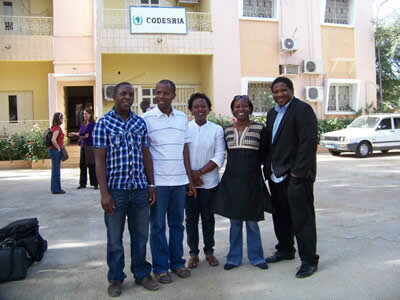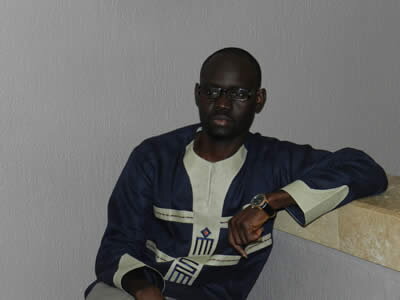

Dr. Emmanuel O. Nuesiri with RFGI colleagues in Dakar, Senegal
Dr. Emmanuel O. Nuesiri holds a bachelors’ degree from University of Buea, Cameroon and a masters’ degree from Cambridge University. He earned his doctoral degree from Oxford University in 2010. In September 2011 he joined the Responsive Forest Governance Initiative (RFGI) based in the Geography Department at the U of I and led by Professor Jesse Ribot. As a postdoc with RFGI, he carried out forest and climate change governance research in Nigeria, and was involved in mentoring other RFGI researchers in Senegal, Ghana, Burkina Faso, Cameroon, Democratic Republic of Congo (DRC), Uganda, and Kenya. The RFGI research in Africa was funded by the Swedish International Development Agency (SIDA), and implemented in partnership with the Council for the Development of Social Science Research in Africa (CODESRIA) Dakar, Senegal, and also with the International Union for the Conservation of Nature (IUCN).
Dr. Nuesiri’s research in Nigeria focused on political representation of local communities engaged in the Reducing Emissions from Deforestation and Forest Degradation (REDD) program of the United Nations. REDD is a global program for mitigating the effects of climate change through forestry programs in developing countries, aimed at boosting the capacity of forests to absorb carbon from the atmosphere. REDD is a cheaper means to reducing carbon in the atmosphere compared with changing industrial practices in the developed world so they emit lower amounts of carbon. Dr. Nuesiri’s research has led to three working papers with the third under review for inclusion in a special RFGI-themed journal issue coming out in 2015.
In September 2014, Dr. Nuesiri was offered a Marie Curie BRAIN fellowship at the University of Potsdam, Germany. At Potsdam, he is a research fellow in the Faculty of Economics and Social Sciences–Chair of International Politics led by Professor Harald Fuhr. Dr. Nuesiri will continue his research on political representation of local communities in developing countries in REDD country programs. Given that non-governmental organizations (NGOs) have a significant role in REDD programs, Dr. Nuesiri's research in Potsdam will also be investigating how NGOs ensure that they are responsive and accountable to the local communities they are representing. In the course of his research in Potsdam, Dr. Nuesiri will be working closely with his RFGI colleagues at the U of I and in select African countries. CAS wishes the very best for Dr. Neusiri, an outgoing postdoctoral fellow and an alumnus of CAS, as he takes up his fellowship at Potsdam.
Select publications from Dr. Nuesiri
Articles
- Nuesiri E. O., 2014, Assessing monetary and non-monetary benefits from the Bimbia-Bonadikombo community forest Cameroon: Policy implications relevant for carbon emissions reducing programmes, Community Development Journal, http://cdj.oxfordjournals.org/content/early/2014/12/15/cdj.bsu061.abstract
- Nuesiri E. O., 2014, Decentralized forest management: A functional utopian discourse, The Geography Journal, http://onlinelibrary.wiley.com/doi/10.1111/geoj.12104/abstract
Working papers
- Nuesiri E. O. (forthcoming) Feigning Democracy: Performing Representation in Nigeria’s REDD+ Programme, RFGI Working Paper
- Nuesiri E. O., (forthcoming) Representation in REDD: NGOs and Chiefs over Elected Local Government, RFGI Working Paper
- Nuesiri E. O., 2014, The Re-Emergence of Customary Authority and its Relation to Local Democratic Government, RFGI Working Paper No. 6
Short communications
- Representation in REDD? (forthcoming) ArborVitae 46 Newsletter of IUCN
- Utopia and saving the African rainforest – should Bob Geldof board this train? (Geography Directions Blog 01 December 2014, http://blog.geographydirections.com/2014/12/01/utopiaand-saving-the-african-rainforest-should-bob-geldof-board-this-train/)
- Secure tenure must be the foundation of adaptation in East and Southern Africa, IUCN-TECS Policy Brief No. 4, July 2014

Dr. Papa Faye
Dr. Papa Faye earned his master’s degree in Rural Sociology in 2003 and a doctorate in 2007 from Cheikh Anta Diop University, Dakar, Senegal. He has conducted research with the Council for the Development of Social Sciences Research in Africa (CODESRIA) since 2004 and was Senegal team leader for the Responsive Forest Governance Initiative (RFGI). He also worked at the Institut Supérieur de Management (ISM-Dakar) and at the Initiative Prospective Agricole et Rurale (IPAR—a West African think tank that focuses on agricultural research and advocacy), from 2007 to 2011. From 15 August 2013 to 16 May 2014, while writing his second PhD dissertation, he visited the University of Illinois’s Department of Geography and Geographic Information Science, and worked under the mentorship of Professor Jesse Ribot. During this time, Dr. Faye also wrote several papers that are currently in press. They include the following:
Faye, Papa 2012. «Choice and Power: Resisting Technical Domination in Senegal’s Decentralized Forestry.” Forest Policy and Economics (2014): http://dx.doi.org/10.1016/j.forpol.2014.10.004.
Faye, Papa. 2014. «From recognition to Derecognition: Hemming in Democratic Representation via Technical Claims.» Responsive Forest Governance Initiative Working Paper Series in Press.
Faye, Papa and Ribot, Jesse. Forthcoming. «Producing Precarity: Regulation and Climate Vulnerability in Senegal.» Paper submitted to Global Environmental Change.
Faye, Papa. 2014. “The Dionewar Committee, a Case Against Environmentality: From Gender Exclusion to Privatization of Forests.” Book chapter forthcoming in Purabi Bose and Han van Dijk, in Pressat Springer: Forest Tenure in the Drylands: The Human Dimensions of Vulnerability in Asia and Africa.
Upon his return to Senegal in May 2014, Dr. Faye received an invitation to present his research in Europe, at Hannover (Germany) and Copenhagen (Denmark). Since September 2014, he holds a PhD in Social Anthropology from University of Bern, with his committee co-chaired by Professor Ribot from the University of Illinois.
Dr. Faye came back to the University of Illinois in October 2014 as a Postdoctoral Research Associate. His research is on local democracy with a focus on the politics of recognition and their effects on representation, citizenship, institutional pluralism, social vulnerability, adaptation capacities, and environmentalism in the sector of decentralized land and natural resource governance.
Faye, Papa 2012. «Choice and Power: Resisting Technical Domination in Senegal’s Decentralized Forestry.” Forest Policy and Economics (2014): http://dx.doi.org/10.1016/j.forpol.2014.10.004.
Faye, Papa. 2014. «From recognition to Derecognition: Hemming in Democratic Representation via Technical Claims.» Responsive Forest Governance Initiative Working Paper Series in Press.
Faye, Papa and Ribot, Jesse. Forthcoming. «Producing Precarity: Regulation and Climate Vulnerability in Senegal.» Paper submitted to Global Environmental Change.
Faye, Papa. 2014. “The Dionewar Committee, a Case Against Environmentality: From Gender Exclusion to Privatization of Forests.” Book chapter forthcoming in Purabi Bose and Han van Dijk, in Pressat Springer: Forest Tenure in the Drylands: The Human Dimensions of Vulnerability in Asia and Africa.
Upon his return to Senegal in May 2014, Dr. Faye received an invitation to present his research in Europe, at Hannover (Germany) and Copenhagen (Denmark). Since September 2014, he holds a PhD in Social Anthropology from University of Bern, with his committee co-chaired by Professor Ribot from the University of Illinois.
Dr. Faye came back to the University of Illinois in October 2014 as a Postdoctoral Research Associate. His research is on local democracy with a focus on the politics of recognition and their effects on representation, citizenship, institutional pluralism, social vulnerability, adaptation capacities, and environmentalism in the sector of decentralized land and natural resource governance.